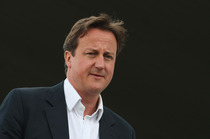 When justifying his decision to keep Gordon Brown’s 50p tax for the super rich, Cameron has recently taken to saying that the well-off must “pay their fair share”. This is worth closer examination. The richest 1% in Britain contribute 24 percent of all income tax collected – it is unclear whether Cameron regards this as “fair” or not. But if he wants it to rise, then it is clear what he should do. Data released last week from America, and picked up by the smarter economics bloggers, gives us a striking example. If he wants to soak the rich, cut their taxes.
When justifying his decision to keep Gordon Brown’s 50p tax for the super rich, Cameron has recently taken to saying that the well-off must “pay their fair share”. This is worth closer examination. The richest 1% in Britain contribute 24 percent of all income tax collected – it is unclear whether Cameron regards this as “fair” or not. But if he wants it to rise, then it is clear what he should do. Data released last week from America, and picked up by the smarter economics bloggers, gives us a striking example. If he wants to soak the rich, cut their taxes.
This US data shows that the richest 1 percent contribute 40 percent of all tax collected. And zoom in on the richest 0.1 percent and they contribute 20 percent, up from 16 percent when George W Bush was first elected president. The old rogue managed to squeeze the rich until their pips squeaked with tax dollars. How? He cut the top rate of tax from 39.6 percent to 35 percent – along with other cuts in dividends etc. – in a 2001 reform enacted in 2003. The left howled with anger about “tax cuts for the rich”; complaining that Bush was looking after his oil rich buddies. Hm, but here’s the paradox which is basic economics: the rich went on to earn, pay and declare more.

As the rich were paying more, the poor were paying a lot less. The below graph should surely have the most ardent redistributionist saying that the American system is fairer.

Now, this is not some weird American experiment. Lawson did this in 1988 (as I blogged) It is basic supply-side economics – or “economics” for short. It was being repeated world over. From Moscow to Mexico, governments grasped the new realpolitik of globalisation. If you want more of their money, then lower their tax rate. According to KPMG’s global tax survey, here are a few of the countries where the tax rate fell from 2003 to 2008.

It sounds paradoxical to voters, so the argument is (alas) never made in public.
California tried the opposite way: raised its taxes for the richest and the watched them emigrate. It was a reverse gold rush and contributed to the state almost going bust.
I argue in my political column tomorrow that the 50p tax has become a stupidity test for the Conservatives. If it survives the first Budget, it shows that Cameron is still mentally trapped by a fear of what Gordon Brown might say – and puts the national interest second to his own fears about political attacks. Sure, he wants to make out that the rich are “paying their fair share” but why not do it another way? A caviar tax would raise more than the 50p tax. The IFS suggests it will lose £800 million – but that’s using 1980s responsiveness data. The rich have transformed since then.
All told, the 50p tax is an act of sabotage by Gordon Brown. Cameron simply cannot be so stupid that he is unaware of this. But I genuinely think he has not sat down with the latest studies (not the 1980s stuff recently released from the IFS – there are a stash of other studies from all around Europe) and asked: how bad could it be? Well, keeping the 50p tax could be the biggest single mistake of Cameron’s premiership: it could lose him £5bn or more, and would deeply damage this country in the process. He needs to sit down and understand just that.







Comments